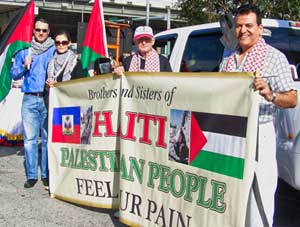Palestinian activist remembered in Houston
By
Gloria Rubac
Houston
Published Aug 26, 2010 9:05 PM
The Palestinian community here has lost a beloved, generous, courageous and
dedicated activist and leader. Abu Obeida Omran was killed during an attempted
robbery on Aug. 13. Four memorials have been held at the Arab American Cultural
Center and hundreds attended his funeral at El Farouk Mosque on Aug. 16 —
including Arabs, Muslims, African Americans, Latinos/as, Asians and whites.
|
Abu Obeida Omran, right, holds banner
reading: “Brothers and sisters of
Haiti,
Palestinian people feel your pain.”
WW photo: Gloria Rubac
|
During the burial a woman said in Spanish that she and her family lived near
one of Obeida’s stores. “When [my boys] got older, he encouraged
them to attend college and even hired them in his store to help them pay
tuition. He allowed them to work around their college schedule. We are so sad
and will miss his kindness and his smile,” she said.
Abu Obeida was a leader of Al-Awda, the Palestine Right to Return Coalition. He
was a member of their national coordinating committee and responsible for the
organization’s external affairs. He was working to develop chapters in
four other cities in Texas. For almost two decades, there was rarely an event
for the Palestinian people in Houston that Abu Obeida did not help organize or
attend.
In the past year many Palestinian refugees arrived in Houston from Iraq. Abu
Obeida helped physically and financially with their resettlement, finding
clothing and furniture, housing, jobs and community for them. “He helped
the refugees like crazy,” said Sahar Abusada, chair of Palestinians for
Peace and Democracy, “because he said he knows how they feel.” He
also sponsored students from Palestine to study in the U.S.
Abu Obeida was from the village of Burin, near Nablus on the West Bank. He came
to the U.S. in 1990, struggling as most immigrants do. He was a parking lot
attendant and worked at pumping gas. Eventually, he became a successful small
business owner. He had just opened the store where he was killed two months
earlier. He had two small sons and a daughter; his spouse is expecting their
fourth child.
Massoud Neyeri, his friend and partner in Al-Awda, said: “Abu always
wanted to give back to the community. I was helping him with collecting school
supplies for the children in the communities where he had his
stores.”
Abu Obeida helped organize the 2009 Viva Palestina convoy to Gaza, raising more
than $150,000. Former British Member of Parliament George Galloway sent
condolences, which read in part: “The first time I saw this gentle giant
was through the Viva Palestina USA convoy. ... He had thrown his heart and soul
into the convoy and entered Gaza wearing his Stetson, his Texan cowboy boots
and with imitation cow horns on his vehicle. He was wearing his trademark red
keffiyah — he was a left-wing Palestinian first and last — and was
received as a hero by the Gazans. ... He was a simply unforgettable character.
In 35 years of working in the Palestinian cause I have never come across anyone
quite like him. He seemed absolutely unstoppable, a force of nature, a
dynamo.”
Bob Carter, a leader of Justice for Palestinians, said: “I knew Abu as a
man of few words who was truly dedicated to the Palestinian cause. In the
background, he was the prime sponsor of countless actions. He was one of the
kindest and most giving persons I have ever known. He left a marvelous example
for all to follow. I miss him greatly.”
“We will mourn Abu Obeida for a long time, but I vow to stay the course
of the struggle he and I joined 20 years ago. I have no choice but to keep the
torch up high till a comprehensive, just and lasting peace in the Middle East
is achieved; until Palestinians finally live in their own independent country
with Jerusalem as its capital, and Palestinian refugees have finally returned
to their homes and land as per U.N. Resolution 194,” said Kamal Khalil,
chair of the Houston Coalition for Justice and Peace in Palestine.
Abu Obeida’s death is a loss to all Houstonians, said Ester King, a
veteran of the U.S. civil rights movement and a community activist. King, a
volunteer for the Black Heritage Society, said he met Omran more than a year
ago as the society reached out to foreign-born owners of stores in
African-American neighborhoods. Omran donated money to preserve
African-American memorabilia, one of the society’s projects.
“Sometimes business people are so focused on their own bottom lines that
they don’t leave a lot of room for social justice,” King said.
“That was not him.”
At Houston’s 2010 Martin Luther King parade, Obeida organized the float
of the Houston Coalition for Justice and Peace in Palestine. Understanding that
the Haitian community was then reeling from earthquakes, he brought the banner
that read, “Brothers and sisters of Haiti, Palestinians feel your
pain.”
Iranian activist Zhaleh Sahand said: “He was instrumental in the struggle
and inspirational. Always modest in his immense generosity, Abu put his money
and efforts where his mouth was. He was a solid body of peace and tranquility
... but militant in his spirit ... determined to bring those in need to the
shore of survival.”
Articles copyright 1995-2012 Workers World.
Verbatim copying and distribution of this entire article is permitted in any medium without royalty provided this notice is preserved.
Workers World, 55 W. 17 St., NY, NY 10011
Email:
[email protected]
Subscribe
[email protected]
Support independent news
DONATE


